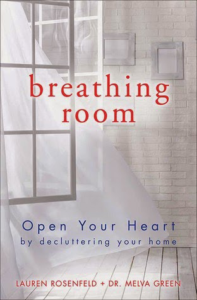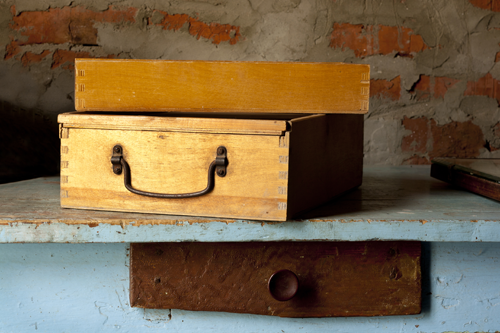If you asked my college roommate to rate my neatness on a scale of 1 to 10, she’d probably say 12. I was Felix Unger to her Oscar Madison, and as much as she drove me crazy with her messiness, I’m sure my extreme tidiness drove her even crazier.
So she would’ve been shocked if she’d seen the state of absolute disarray I’d allowed my garage to fall into over the last few years. It used to be neat as a pin, but things just kept piling up until I could barely walk around inside it. The messier it got, the worse I felt, embarrassed by the clutter and worried that someone else might see it.
The deeper truth is that I couldn’t bear the thought of throwing (or even giving) away anything that belonged to them. Their deaths had been painful enough; I feared that losing their stuff would render them lost to me forever.
So I kept procrastinating on cleaning out the garage—until I came across Breathing Room: Open Your Heart by Decluttering Your Home (Beyond Words). I started to read and couldn’t put the book down. “We all have a place where we store our memories,” wrote the authors, Lauren Rosenfeld, a “professional soul declutterer,” and Dr. Melva Green, a psychiatrist. “There’s nothing wrong with hanging on to what’s valuable. Trouble is, most of what we put away…is not valuable at all. That’s not to say that, at one time or another, it wasn’t. But not everything we store away retains its monetary, emotional, or spiritual value. What’s more, the more stuff we shove into that space, the less likely it is that we are going to be able to get our hands on the things we need when we want to take them out and look at them.”
I related completely and decided right then that I couldn’t let any more time pass under the burden of my overflowing garage. I set aside one entire day for this project and—with help from my boyfriend, who brought the perfect combination of strength (for lifting heavy furniture and boxes) and sensitivity (he understood how difficult this would be for me) to the task—began early in the morning. His job was to remove everything from the garage and set up a shelving system inside. Mine was to sort through the contents, get rid of as much as possible, set aside anything that could be donated, and put everything that remained neatly back into labeled boxes. He would then place those boxes in the garage on his beautifully arranged shelves.
We both knew the “get rid of as much as possible” step would be the hardest. He was strict, refusing to allow me to keep a dresser that had belonged to my mother. I wanted to hold onto it because I had a clear memory of the day she’d brought it home from an antique store and painted it a shade of green I’ve never forgotten. Finally, he got me to see that the dresser was worn out and broken and would be nearly impossible to repair. I let it go.
And to think I’d worried that cleaning my garage would take my parents away from me. Instead, they returned. And now that my garage is clean, I feel ready to tackle the attic.
And to think I’d worried that cleaning my garage would take my parents away from me. Instead, they returned. And now that my garage is clean, I feel ready to tackle the attic (where more of their belongings are stored). As happy as I am to have the book back, I’ve learned that it’s my memories, not the objects, that matter. “Our souls are not contained within our stuff,” as the authors of Breathing Room wrote. “Nor is the meaning of our relationships or the importance of our shared history defined by our belongings.”
For anyone who feels as I did—overwhelmed by clutter for deeply emotional reasons—I hope this book is equally motivating and inspiring. Here, an excerpt:
When we hear people talking about clearing their clutter, the most frequently used word we hear is the word “attack,” as in “I am going to set aside this weekend and attack the clutter on my desk.” To this, we answer: Stop! Don’t attack anything!
You are not in a fight with your clutter. It is not your enemy. It is not evil. It only holds as much energy as you are willing to give it. When we say we are going to attack our clutter, we are saying that our clutter is powerful, and we need to gird ourselves for battle. Our clutter has power over us to the degree we give it power. If we treat it like a strong adversary, we are going to wear ourselves out before we’ve even begun.
 Decluttering does not have to be a fight. Here’s the thing about fights: they require adrenaline and they utilize our animal brain. Whenever we engage our adrenaline, we cannot process deeply or think clearly. We cannot use our higher-order reasoning skills, access our real emotions, or feel our connection to the Divine. In order to be our most loving, wisest selves, we need to be able to access all of these. As we do this important spiritual work, we don’t need to be ruthless. We don’t need to be heartless.
Decluttering does not have to be a fight. Here’s the thing about fights: they require adrenaline and they utilize our animal brain. Whenever we engage our adrenaline, we cannot process deeply or think clearly. We cannot use our higher-order reasoning skills, access our real emotions, or feel our connection to the Divine. In order to be our most loving, wisest selves, we need to be able to access all of these. As we do this important spiritual work, we don’t need to be ruthless. We don’t need to be heartless.
The other thing we need to remember about adrenaline is that our bodies produce it when we are under stress. Adrenaline causes a surge in energy that can be very powerful—while it lasts, that is. But the energy of adrenaline is quickly depleted. And then what happens? We are exhausted. Our brains go numb. Our limbs go limp. We can’t move another muscle. We appraise the work we’ve done and think how hard it was, how little we accomplished despite the energy we spent.
So we need to clear with compassion. For ourselves, yes, but also for our clutter. Rather than thinking of clutter as an enemy that needs to be vanquished, we are going to think of it as a small, lost child who wandered into the wrong place. We can treat it with gentle curiosity (“Now, how did you get in here?”), quiet honesty (“You don’t belong here”), and ultimately a firm hand (“C’mon. Let’s get you out of here and back where you belong”).
You are not in a fight with your clutter. It is not your enemy. It is not evil. It only holds as much energy as you are willing to give it. When we say we are going to attack our clutter, we are saying that our clutter is powerful, and we need to gird ourselves for battle. Our clutter has power over us to the degree we give it power. If we treat it like a strong adversary, we are going to wear ourselves out before we’ve even begun.
[First], we are just going to work on the clutter that needs to be moved to another room or needs to be donated so that it can serve someone else. Get two boxes or bags: one marked “relocate” and one marked “donate.”
Always begin by setting your intention for the room or the area that you are clearing. You are going to look for things that do not resonate with your intention and that need to be put into one of your boxes. You’re looking for things that either belong somewhere else in your home, in a space with a clear intention or they do not fit in with any intention in your home and are better off with someone else.
Now, picking up each object, draw into your heart the compassion you’d feel for a lost child. To some of these objects you’ll say, “You have wandered into the wrong room. I know just where you belong.” Those objects go in the relocate container. To other objects, you’ll need to say, “You have wandered way too far. My home is not the place for you at all, but I am sure that we can find somewhere you do belong.” Those objects go into the donate container.
We need a different kind of compassion for things that have served their purpose, do not belong in your home, and cannot be donated. These items simply need to be thrown out. That can be the hardest thing to do. When we throw things out, we can feel that we’re being wasteful and ungrateful.
How is it possible to throw things out with love? It would seem that throwing things out is the opposite of compassion. Think about a party you have at your home. Your most conscientious guests have already left. But there’s a group of folks that just won’t go. … Do you push them out aggressively? No. … Here’s what you do: sidle on up to them and say, “Oh my gosh! You all are still here. … No, you don’t have to stay to help clean up. You’ve done enough already just by being here. You’ve honored me with your presence. Now be safe out there, okay?”
And you shut the door. You can hear their laughter on the sidewalk. They’re happy, not offended. You offered them compassion. They needed a hand and a direction to go, and you offered it.
It’s hard to throw people out of your house, just like it’s hard to throw objects out. It might feel as if you are dishonoring them and their intentions or being inconsiderate and ungrateful. But you’re not a bad person—not at all. You are honoring the sanctity of your home and your need to rest easily within it.
This excerpt was taken from Breathing Room by Lauren Rosenfeld and Dr. Melva Green and reprinted with permission of Beyond Word Publishing/Atria Books, Hillsboro, Oregon.




1 Comment
Ernest Rosenberg
It’s a beautiful example, for me, of how the finest urges (holding on to what I love) need to be carefully packaged or they will evolve into a mess.